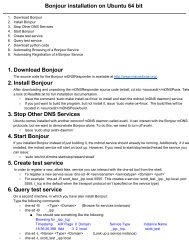Buffer Overflow Vulnerability Lab
Buffer Overflow Vulnerability Lab
Buffer Overflow Vulnerability Lab
You also want an ePaper? Increase the reach of your titles
YUMPU automatically turns print PDFs into web optimized ePapers that Google loves.
<strong>Lab</strong>oratory for Computer Security Education 2If you are using a Fedora virtual machine for executing this lab task, please disable exec-shield before doingso.Moreover, to further protect against buffer overflow attacks and other attacks that use shell programs,many shell programs automatically drop their privileges when invoked. Therefore, even if you can “fool”a privileged Set-UID program to invoke a shell, you might not be able to retain the privileges within theshell. This protection scheme is implemented in /bin/bash. In Ubuntu, /bin/sh is actually a symboliclink to /bin/bash. To see the life before such protection scheme was implemented, we use another shellprogram (the zsh), instead of /bin/bash. The preconfigured Ubuntu virtual machines contains a zshinstallation. If you are using other linux systems that do not contain zsh by default, you have to install zshfor doing the lab. For example, in Fedora linux systems you may use the following procedure to install zsh$ suPassword: (enter root password)# wget ftp://rpmfind.net/linux/fedora/(continue on the next line)core/4/i386/os/Fedora/RPMS/zsh-4.2.1-2.i386.rpm# rpm -ivh zsh-4.2.1-2.i386.rpmThe following instructions describe how to link the zsh program to /bin/sh.# cd /bin# rm sh# ln -s /bin/zsh /bin/shFurthermore, the GCC compiler implements a security mechanism called ”Stack Guard” to preventbuffer overflows. In the presence of this protection, buffer overflow will not work. You can disable this protectionwhen you are comiling the program using the switch -fno-stack-protector. For example, to compilea program example.c with Stack Guard disabled, you may use the following command:gcc -fno-stack-protector example.c2.2 ShellcodeBefore you start the attack, you need a shellcode. A shellcode is the code to launch a shell. It has to beloaded into the memory so that we can force the vulnerable program to jump to it. Consider the followingprogram:#include int main( ) {char *name[2];}name[0] = ‘‘/bin/sh’’;name[1] = NULL;execve(name[0], name, NULL);The shellcode that we use is just the assembly version of the above program. The following programshows you how to launch a shell by executing a shellcode stored in a buffer. Please compile and run thefollowing code, and see whether a shell is invoked.




